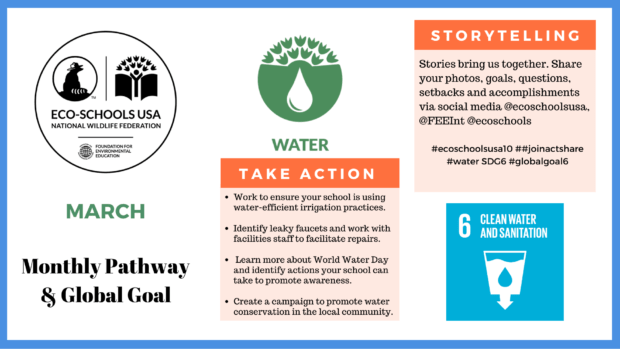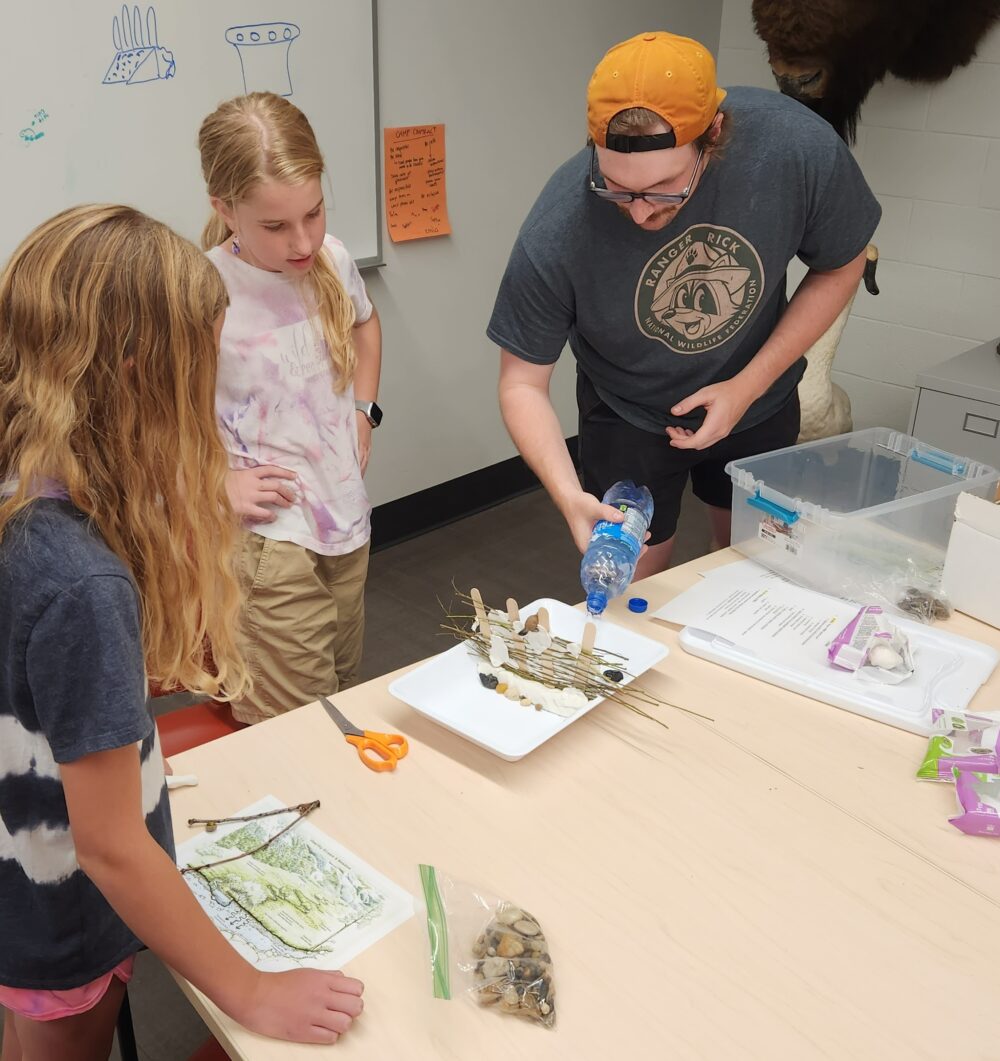We have much more to do and your continued support is needed now more than ever.
Eco-Schools USA March Newsletter

Climate change is ravaging our shared world, yet the voices uplifted aren’t those of climate refugees or of frontlines land defenders. We rarely hear from indigenous peoples, the holders of 80 percent of the world’s remaining biodiversity. My people are the keepers of the sacred—the last beautiful places, rich ecosystems, and healthy earth left.
~Tara Housaka, What Listening Means in a Time of Climate Change. Follow Tara @zhaabowekwe
Welcome to March 2020. Along with this month’s topics, we will also be celebrating Women’s History Month. Follow us on Facebook, Twitter and Instagram as we celebrate pioneers, change-makers, and the future of environmental and conservation stewardship, @EcoSchoolsUSA.
In This Edition
- National Wildlife® Photo Contest
- Pathway Focus: Water
- Using Schoolyard Habitats® to Help the Monarch Butterfly
- Learning About Wildlife: Blue Whale
- Green Grants and Opportunities
National Wildlife® Photo Contest
Calling all student photographers! Do you have a passion for wildlife and nature you want to share and use to inspire others? Youth age 13-17 are invited to use their photography skills to help protect wildlife and wild places by entering the National Wildlife® Photo Contest. Start by exploring these nature photography tips and resources. All the details about the photo contest can be found here on the Eco-Schools USA website.
Pathway Focus | Water
Goal 6
Ensure access to water and sanitation for all
Water security and water conservation are timely, important issues that need to be addressed, particularly due to climate change and shifting weather patterns. Water conservation at school is one way students can take action and is not only positive for the environment but also has a measurable, money-saving impact for a school district. During the month of March, our focus will be on the Eco-Schools USA Water Pathway. Students can start with the grade-banded audits to assess the current situation in and around the school.
Next, create an action plan addressing problems such as leaky faucets or inefficient irrigation practices. Find audits and sample action plans, along with our 10 Tips to Conserve Water on the Eco-Schools USA Water Pathway page. For a global perspective, connect students to the UN’s Sustainable Development Goal 6 Clean Water and Sanitation. Discuss issues like water scarcity around the world, Indigenous water rights and learn why clean water matters to wildlife.
Throughout the month, stay informed about the Water Pathway and Global Goal 6 by following @EcoSchoolsUSA on social media. Commit to sharing World Water Day’s message—by raising awareness of global issues relating to climate change and water scarcity. Share your stories by tagging us on social media. #EcoSchoolsUSA #WaterPathway
Using Schoolyard Habitats ® to Help the Monarch Butterfly

There have been several recent news stories about the decline of the monarch butterfly and in particular the western monarch population. Start the classroom discussion by using two recent blogs from the National Wildlife Federation—Can Western Monarchs Still Rebound? and 5 Ways You Can Help Western Monarchs. Each blog highlights actions that can be taken, no matter where you live, to counter habitat loss, a primary cause of monarch decline. Creating a monarch garden at school gives students an opportunity to learn about the importance of pollinators. Read more about our Monarch Heroes from Texas, and see how students there are engaged in activities that support monarch recovery.
Not sure where to start? Learn how to Create a Schoolyard Habitat for Monarchs and Other Pollinators. Explore Eco-Schools USA monarch resources and use The Monarch Mission: Empowering Students to Improve Monarch Habitat, to implement lessons and activities both inside and outside the classroom. A Spanish language version of the curriculum is also available for download.
MONARCH RESOURCES
In the Classroom | Earth Day 50
This Earth Day marks the 50th anniversary since the April 22, 1970 gathering of millions of Americans around the concerning state of the planet. The people’s call to action led to the eventual passage of the Clean Water, Clean Air, and Endangered Species Act. Today Earth Day is celebrated by billions of people across the globe and is used as an opportunity to take action for the planet and reminds us that every day is Earth Day.
This Earth Day 50, the National Wildlife Federation, Project WILD and the Project WET Foundation are working together to provide educators the resources they need to engage students in a week of climate education, community building, and storytelling. Register now for our co-hosted Earth Day 50 Professional Development.
Stay tuned for more information. Our countdown to Earth Day 50 begins Monday, March 23, 2020.
Learn About Wildlife
Have you ever had the opportunity to go whale watching? There is nothing like seeing these magnificent creatures in their natural habitat to inspire a conservation mindset. The March issue of Ranger Rick® Magazine takes students on a journey with Big Blue. They will learn about the blue whale’s eating habits, communication with other whales, and migration patterns. The free March Ranger Rick® Educator’s Guide has a Facts About Big Blue student page to accompany the story. Students can also use the National Wildlife Federation Wildlife Guide as a resource for further research about the blue whale – topics include range, diet, and conservation status.
Green Opportunities and Grants
Each month we highlight action days, upcoming professional development, webinars, and environmental grant opportunities from around the country.
- Youth can apply by Friday, March 20th for the 2020 Craig Tufts Scholarship Award; learn more and submit an application for a scholarship to attend the week-long Family Nature Summit
- Take action for World Water Day on 3/22/20
- High School students and clubs – Register for the National Wildlife Federation EcoCareers Conference April 1-2, 2020
- Join the 6th Annual Carton 2 Garden Contest; entries are due by 4/1/20
- Explore the Event Promotion Toolkit to organize an event for Endangered Species Day on May 15, 2020
- Take Climate Action by making a pledge to take positive action for the planet.
- The World’s Largest Lesson – Global Goal 6: Clean Water and Sanitation
- 2020 Farm to School Grant Request
- Bow Seat Ocean Awareness Contest, Climate Hope: Transforming Crisis; Enter by 6/15/20
PROFESSIONAL DEVELOPMENT























